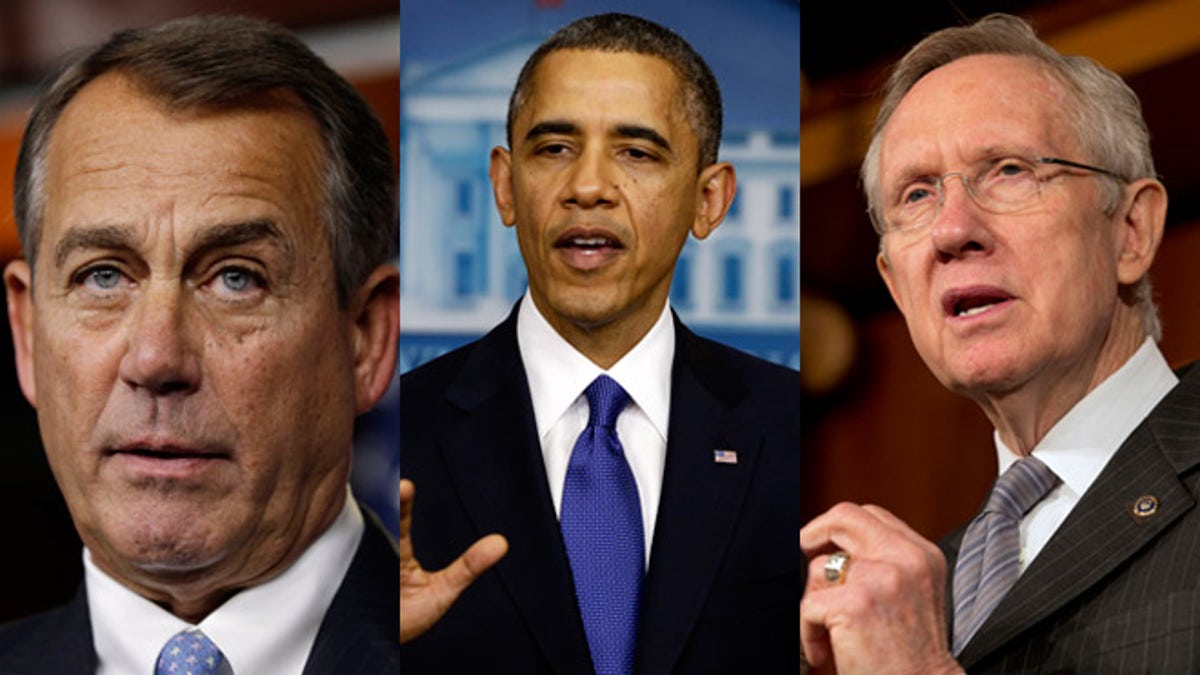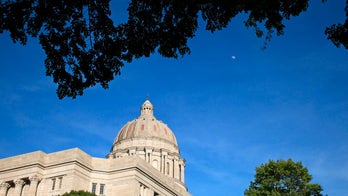
House Speaker John Boehner, President Obama and Senate Democratic Leader Harry Reid have only a few days left to strike a deal averting sweeping tax hikes and spending cuts. (AP)
Congress is used to working against a deadline.
But the task of averting more than $600 billion in tax hikes and spending cuts in less than a week is daunting even by Washington standards -- though as usual, the predicament is the product of lawmakers' failure to act sooner.
Coming out of the Christmas holiday, all sides are voicing hope that the pressure of a Jan. 1 deadline will at last yield an agreement on the looming fiscal crisis. The White House confirmed that President Obama plans to fly Wednesday night out of Hawaii, where he's been on vacation with his family, and arrive in Washington early Thursday.
Officials cited a "unanimous desire" on Capitol Hill, with a few exceptions, to avert the doomsday scenario of income tax hikes, investment tax hikes, defense cuts and a cut-off in long-term unemployment aid all at once.
But few are spelling out exactly how that might happen. Over the long holiday weekend, it seemed as if not a creature was stirring on the fiscal crisis front.
A spokesman for House Speaker John Boehner said the president and the speaker did not talk over the weekend. Representatives for the Republican and Democratic Senate leaders both said Monday they had "nothing" to report.
It's hard enough to write and pass a comprehensive budget bill in a matter of days -- let alone try to do it without a roadmap.
The options for averting the crisis dwindled last week after Boehner abruptly pulled his "Plan B" proposal from the floor, citing a lack of Republican support. That bill, though fiercely opposed by Democrats, would have extended current tax rates for all but those making over $1 million.
The move, though, also effectively sidelined talks between Boehner and Obama toward a broader compromise agreement.
Obama aides and lawmakers are now talking about a scaled-down package as the most likely vehicle for solving the problem, something that could at least prevent most of the scheduled tax hikes and maybe extend jobless aid. Then lawmakers could renew the debate early next year over the most contentious issues of entitlement cuts and tax reform.
Democrats and Republicans still need to decide who, if anyone, would see a tax hike next year. And lawmakers still need a bill to work from. The administration official suggested there was a bit more contact in recent days between White House staff and Senate Democratic leadership staff -- indicating that new legislation, if proposed, could come from the Senate side.
Boehner, in announcing late last week that he did not have the votes to pass Plan B, called on the Senate to make the next move.
"At some point the United States Senate has to do something," Boehner said. "What we were trying to do this week was to basically jumpstart and try to kick into gear some action by the Senate to avert these tax increases go into effect January 1."
Congress has been in the position of having to craft an 11th-hour deal plenty of times before, most recently over the vote to raise the debt ceiling but also on countless budget bills and tax cut extension packages.
The senior administration official said the pressure mounting this week should "animate" all sides to come together on a deal.
If Washington cannot, however, Americans are in for a historic blow. The rollback of the Bush-era tax rates is estimated to cost the typical middle-income family more than $2,000 a year. Another expiring tax provision could cost thousands more.
Investment taxes and the estate tax are also scheduled to rise. And the automatic budget cuts could slam defense contractors and other businesses that rely on Washington.
The Congressional Budget Office has predicted a double-dip recession if the stalemate drags on well into 2013.
Fox News' Ed Henry contributed to this report.




